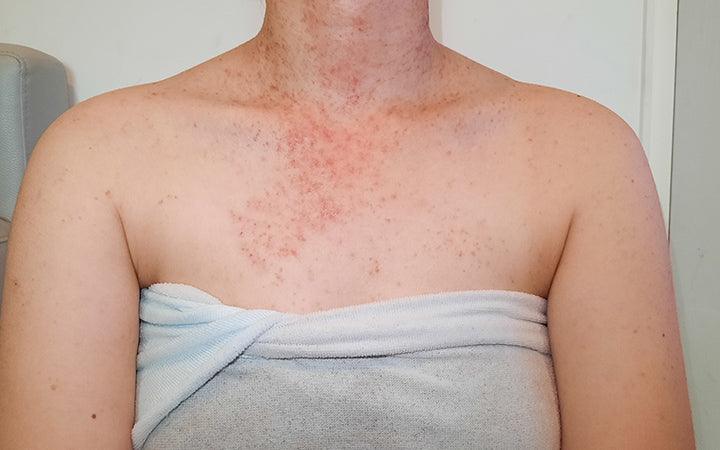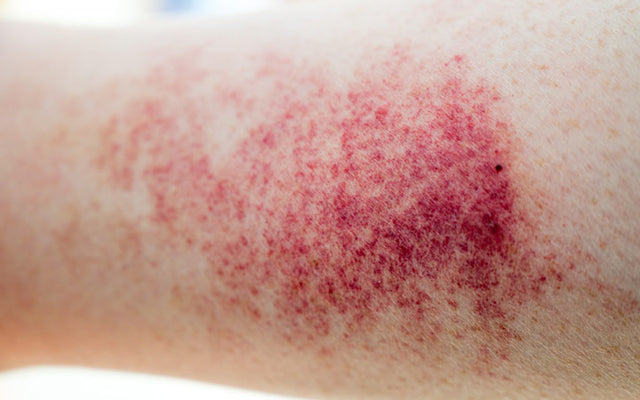Do you have breakouts on your body that refuse to go in spite of following a good skincare routine? There is a high probability that you have fungal acne.
Even if you haven’t experienced it yet, it is wise to know what it’s all about. This will ensure you’re always prepared for surprise skin conditions. We tell you how to distinguish fungal acne from regular acne and ways to prevent and treat it.
Highlights:
What Is Fungal Acne?

Fungal acne is a common skin condition that is often misdiagnosed. It is caused by the overgrowth of a yeast present in the follicles of the hair.
It thrives on the sweat produced by the skin. In scientific terms, it is known as malassezia (pityrosporum) folliculitis [1].
How Do You Know If Your Acne Is Fungal?
Fungal acne makes your skin itchy, unlike regular acne. It can also irritate the skin to the extent that it goes red. Fungal acne can increase in size and even contain pus.
They look like small whiteheads, usually appearing on the chest,
shoulders, hair roots and back and appear in clusters. [2]

Word Of Caution:
Antibiotic creams used for bacterial acne may worsen the condition and regular anti-acne creams will not be effective in treating fungal acne.
Common Causes Of Fungal Acne
The yeast that causes fungal acne is present in every human body. However, it is more prevalent among adolescents, possibly due to the increase in production of sebum (natural oils) in the sebaceous glands during puberty.
Here are some of the main triggers for fungal acne:
- Excessive sweating can cause fungal acne. Hence people living in hot and humid climates are more prone to it as the yeast thrives on sweat. Heavy workouts can also cause it.
- Since fungal acne can be contagious, and yeast has a tendency to spread, it can be spread through close body contact with others.
- Wearing restrictive clothing or sweating under our garments and not showering to wash off the sweat can also be a trigger.
- The use of antibiotics (topical or oral) and immunosuppressants are also a cause.
How Can You Get Rid Of Fungal Acne?
Seeing a dermatologist is imperative if you suspect you have fungal acne. Some of the treatment options he may prescribe are:
1. Medical Treatments
Since fungal acne is basically a yeast overgrowth inside the follicles of the hair, oral anti-fungal medications like Fluconazole and Ketoconazole can be prescribed depending on the severity of the condition.
The drugs can penetrate deep into the follicle and stop the yeast from growing further.
2. OTC Or Creams
OTC treatments usually include anti-fungal shampoos that contain sulphur. You can even use antibacterial shampoos. They need to be applied on the scalp, lathered and left on for a few minutes before being rinsed off.
Sometimes, oral antifungal treatments are prescribed along with topical ointments.
3. Home Remedies
Lactobacillus produces lactic acid which can control the production of the yeast. So, have more yoghurt in your diet and you can also take lactobacillus supplements.
Honey has antimicrobial qualities. So apply it on the affected area and keep it on for as long as you can, even for a few hours if possible.
Tea tree oil is another antimicrobial that can be used. Dilute it with water and apply only on the acne as it can irritate the skin if applied all over.
How Long Does It Take To Get Rid Of Fungal Acne?
Fungal acne can recede with adequate treatments depending on its severity, but it can never really go away completely. It can recur with the changing of seasons and lifestyle habits.
The Dos and Don'ts
You can’t really prevent fungal acne, but taking precautions helps keep it at bay.
Dos:
- Keep your skin dry and clean during and after a workout.
- Use an antifungal body wash at least once a week.
- Use products that have petrolatum, salicylic or glycolic acids.
- Regularly switch your usual shampoo with an anti-fungal one to prevent fungal acne.
- Shower twice or thrice a day on hot and humid days.
Don’ts:
- Avoid wearing very tight clothing, especially synthetic fabrics, which block the sweat and don’t let your skin breathe.
- Remove sweaty clothes right away and don’t wear them a second time without washing.
- Avoid products that contain benzoyl peroxide, fatty acids such as lauric acid [coconut oil], linoleic acid and any product that helps dry skin to recover.
Wrapping Up
Fungal acne is not often diagnosed correctly. So if you have acne appearing on your neck, chest or shoulders, see a dermatologist. It requires different treatment protocols and prevention works better in the long run.
Recommended Products
Was this Article helpful?
- Least helpful
- Most helpful











